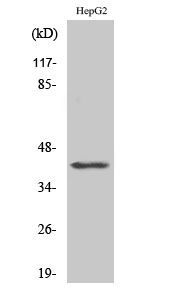

| WB | 1/500-1/1000 | Human,Mouse,Rat |
| IF | 咨询技术 | Human,Mouse,Rat |
| IHC | 咨询技术 | Human,Mouse,Rat |
| ICC | 技术咨询 | Human,Mouse,Rat |
| FCM | 咨询技术 | Human,Mouse,Rat |
| Elisa | 1/10000 | Human,Mouse,Rat |
| Aliases | ACT |
| Entrez GeneID | 345651 |
| WB Predicted band size | Calculated MW: 42 kDa; Observed MW: 42 kDa |
| Host/Isotype | Rabbit IgG |
| Antibody Type | Primary antibody |
| Storage | Store at 4°C short term. Aliquot and store at -20°C long term. Avoid freeze/thaw cycles. |
| Species Reactivity | Human,Mouse |
| Immunogen | The antiserum was produced against synthesized peptide derived from human ACTBL2. AA range:81-130 |
| Formulation | Purified antibody in PBS with 0.05% sodium azide,0.5%BSA and 50% glycerol. |
+ +
以下是3篇关于β-Actin抗体的参考文献(注:文献中常用β-Actin作为内参蛋白,可能与“Kappa Actin”存在术语差异):
---
1. **标题**:*β-Actin as a loading control in western blot analysis*
**作者**:Dittmer A, Dittmer J
**摘要**:本文探讨了β-Actin作为蛋白质印迹内参的可靠性,指出其在某些实验条件下(如细胞高分化或迁移状态)表达可能不稳定,建议结合其他内参蛋白使用。
---
2. **标题**:*Antibody-based proteomics for human tissue profiling*
**作者**:Uhlen M et al.
**摘要**:该研究利用高通量抗体技术对多种人类组织进行蛋白表达谱分析,验证了β-Actin抗体的广泛适用性,并提供了标准化实验流程。
---
3. **标题**:*Comparative study of β-Actin antibodies in immunohistochemistry*
**作者**:Jiang X, et al.
**摘要**:比较了不同商业来源的β-Actin抗体在免疫组化中的表现,发现部分抗体存在交叉反应性,强调抗体验证在实验中的必要性。
---
注:若需针对“Kappa Actin”(非β-Actin)的文献,建议进一步确认术语准确性或补充实验背景信息。
**Background of κappa Actin Antibody**
Actin, a highly conserved cytoskeletal protein, plays crucial roles in cell motility, structure maintenance, and intracellular signaling. Mammals express six actin isoforms, categorized as α, β, γ, and others, with β-actin and γ-actin (sometimes referred to as "kappa" actin in specific contexts) being predominant in non-muscle cells. These isoforms share >90% sequence homology but exhibit distinct subcellular localization and functions. β-actin is often linked to cell migration and cytoplasmic dynamics, while γ-actin (or κ-actin) is enriched in stress fibers and cortical regions, contributing to mechanical stability.
The κappa Actin antibody specifically targets the γ-isoform, though nomenclature inconsistencies ("kappa" vs. "gamma") may arise across studies. This antibody is widely used in Western blotting, immunofluorescence, and immunohistochemistry to study cytoskeletal organization, cell differentiation, and disease mechanisms (e.g., cancer metastasis, neurodegeneration). Its utility as a loading control is debated due to potential variability under stress or pathological conditions, unlike β-actin, which is more commonly used for normalization.
Raised against conserved epitopes (e.g., synthetic peptides from the N-terminal region), κappa Actin antibodies are typically monoclonal or polyclonal, with species-specific reactivity (human, mouse, rat). Researchers must validate specificity to avoid cross-reactivity with other actin isoforms. Overall, κappa Actin antibodies remain vital tools for exploring cytoskeletal dynamics in cellular and molecular biology.
(Word count: 247)
×